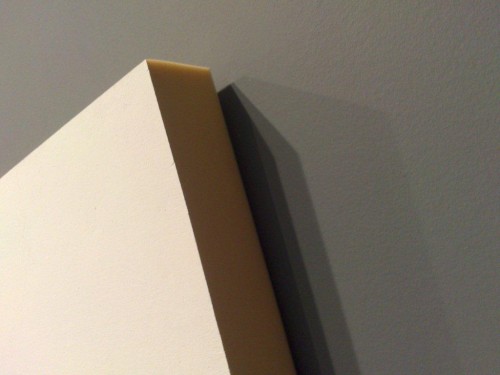
Rosemarie Trockel
“The military-police mindset has been embodied in the creation of Joint Terrorism Task Forces around the country, bringing local cops together with Homeland Security, the FBI and other federal agencies. At the same time, billions of dollars worth of military hardware, from assault rifles to armored vehicles, are being funneled annually from the Pentagon to local police departments, creating a militarized force suitable for deployment in a domestic war.
The real significance of these developments was demonstrated first in the martial law lockdown of the Boston metropolitan area following the Boston Marathon bombings of April 2013. An entire population was turned into prisoners in their own homes and subjected to warrantless searches by helmeted and machine-gun toting police backed by armored vehicles—all supposedly to capture one 19-year-old youth.”
Bill Van Auken
“Dispossession is now the fiercest form of possession.”
Robert Hullot-Kenter
“The US wants from Cuba the complete servility that Poroshenko displayed when he visited Washington and addressed the US Congress asking for help. His speech called to mind the words of Brutus to Cicero about a letter he wrote to the aspiring emperor Octavian, “Read again your words and deny that they are the supplications of a slave to a despot.”
Christopher Black
“Contrast the mild treatment the media gave to the recent large-scale hacks into Target, Home Depot and JP Morgan, in which millions of credit cards and personal information were stolen, with the coverage of the cyberattack on Sony Pictures. It is impossible to avoid the conclusion that political considerations are driving the media furor over the latter case.”
Greg Elich
I was thinking about, again, the anti-Freudian sentiments I continue to run into. And I realized this week, after my earlier posting about the Oedipal narrative, that in a certain sense the significance of Freud has diminished for very clear reasons. They are not the reasons most of today’s critics claim, however. They have diminished because today the sense of history has receded out of sight. Out of conceptual grasp. In much the same way that the resurgent fascism seen now throughout the world has reduced much political debate pointless. Or rather the pointlessness is the result of an overarching uniform one dimensional irrationality having blanketed almost all of experience. If one reflects for a moment on the Sony hacking story — the one featuring a new film starring Seth Rogan and James Franco– what one takes away from this is an absolute mutability of meaning in all public discourse. The film itself, The Interview, is not just arrogant fascistic and pro-Imperialist; it is indifferent to itself. Its not even a cartoon. It’s not that good. Not that substantive.

Jared French
To contemplate the real disappearance of an active historical imagination, and of historical memory (they over lap) is a hugely disturbing prospect. It’s worse than hugely disturbing, it is psychically catastrophic. And as a society today, that catastrophe is teetering. There is a side bar issue I’ve mentioned before and that is the very particularly white resistance to the idea of manipulation. (Even scholars like Axel Honneth tends to discredit Adorno by accusing his theory of the culture industry of being “just a crude version of a theory of manipulation”. That this is patently not the case, at all in fact, one wonders how Honneth still has a job…..or maybe not). But I digress — for the horror of our world finally and irrevocably slipping away from itself and into a swirling psychic muddle of homogenized reflex is too much to think on for too long.
It is in film and TV that the most obvious enclosing of memory takes place. Consider the shows cancelled recently; The Divide, one of the few anti death penalty legal shows ever produced for US television. Written by (largely) and created by Richard LaGravenese, and Tony Goldwyn, this was a show about a lawyers working pro-bono to correct state injustice. Not a perfect show, but close enough. With an outstanding cast including Marin Ireland, Joe Anderson, and Clarke Peters. Cancelled. The Paradise, a UK adaptation of a Zola novel, created by Bill Gallagher, this was in a sense the corrective to Downton Abby. Cancelled after two short seasons. The Canadian show from 2008, Intelligence (not to be confused with the recent US series). This was a singularly compelling bit of crime noir with too many political themes, so many in fact that Canadian government stepped in to help terminate the series. The story of government bribes taking was deemed too sensitive at that moment for the Canadian state to tolerate. So much for free speech….again. Anything that demands a questioning of the real world can count on being cancelled. One could go on, and it might be an interesting thought experiment, but the point is that mass culture is largely, say 99%, product that is strongly reinforcing of the status quo. And the mechanisms by which this is accomplished are very directly linked to this narrowing of world view; for there is usually a very pronounced theme, and a theme that is expressed in very familiar almost formulaic terms. Product must be reassuring.
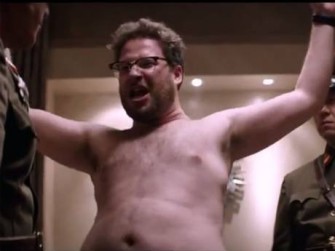
Seth Rogan in “The Interview” (2014).
But the issue of free speech probably needs a bit more attention in this context. First off, that many liberal journalists have proclaimed righteously that one must not be cowardly and cave in to the dastardly North Koreans is evidence of just how poorly educated are young graduates of English departments, or Journalism MFA programs. It was obvious, from the start, that the DPRK did not hack Sony.
Gary Leupp writes:
“It’s as though the managing editors of the entire corporate press, deferring by habit or inclination to the pronouncements of the FBI, had for weeks instructed their talking heads and print journalists to spin the story as they did–as a clear-cut case of North Korean “cyber-vandalism” if not “cyber-terrorism.”
It’s been oh, so typical! After the sarin gas attack in Syria on August 21, 2013, the Obama administration declared that the government of Bashar al-Assad was responsible, although that allegation was questioned then and now, by the Russian Foreign Ministry and investigative reporter Seymour Hersh, among others.
After the downing of Malaysia Airlines Flight 17 over Ukraine on July 17, 2014, the U.S. State Department immediately blamed pro-Russian separatists and by association Moscow for the tragedy. But Robert Parry, another award-winning investigative reporter, has questioned this and suggested that the Pentagon actually suspects that Ukrainian government forces are responsible, as intimated by the Russians. The latter have provided some of their surveillance data while the U.S. has provided none.
It’s still not really clear who’s to blame in either episode. What is clear to thinking people (a category excluding most bought and paid for cable news anchors) is the U.S. proclivity to fix intelligence around policy–to lie to the people to justify aggressive moves, whether against Serbia or Iraq or Syria or Libya or Iran or Russia or North Korea.”
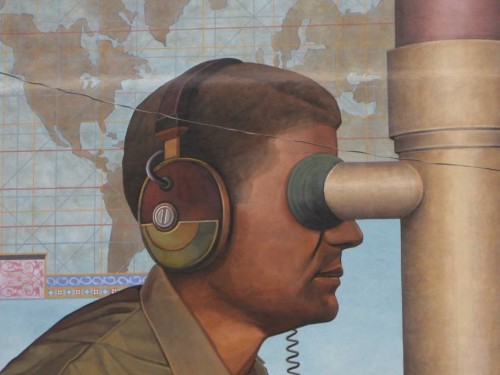
Vincent Desiderio
One has to remember that the DPRK was one of the axis of evil, a member in good standing. But where is the alternative press on this? As I say, decrying the cowardice of Sony to ‘cave in’ to terrorists, or some such shit. Lets take a look at this film though, before going off on free speech much longer. This is another in a long line of white men comedies, featuring young white slackers of some variety, or just anxiety ridden, and it is the legacy of Harold Ramis’ films and John Belushi, and even Adam Sandler. Rogan, a Canadian whose parents met while working on a kibbutz in Israel, is a supporter of Zionist/Israeli policy, and clearly is in line with the politics of the picture. Franco, another in a long line of pretty boy/men determined to find cred, to be taken seriously, is also, sadly, visibly stupid. His endless sort of self conscious and earnest attempts at art films are mostly unwatchable (The Hart Crane biopic for example). The Interview was co-directed by Rogan and frequent collaborator Evan Goldberg. The point here is twofold: first, OBVIOUSLY North Korea didn’t fucking hack SONY. Second, Obama spun the story as if they had, well past sell by date. And third, the film itself is noxious, racist, orientalist. Fourth, if the DPRK had made a film with Hillary’s or Barry’s or Cheney’s head exploding….after first depicting them *partying* with naked models, and discussing *pussy*, I’m thinking that all of Washington and its press lackeys would be up in arms with froth spitting from their blue lips in furious indignation. Seth Rogan comedies do not quite rise to the level of Ulysses or Naked Lunch nor is Rogan quite Henry Miller or Sinclair Lewis or even Brendan Behan.

Korean postcard, appx 1920. Seoul.

Hans Van Vrouwerf, photography.
The only interesting aspect, really, about this story is that the U.S. state department was supportive of this film getting made, and supportive of the final scene of the leader of North Korea having his head shot off. In other words, such actions fit perfectly with U.S. foreign policy. And secondly, to return to my original point, it is representative of this narrowing of intention, and of expression, and the receding of actual history. It is perhaps worth adding this piece by Greg Elich as a sort of footnote to this whole saga. http://mrzine.monthlyreview.org/2014/elich291214.html
I have wondered this week about the lack of government action on climate issues. This of course is the same question that has been asked of other national leaders throughout history. The difference is that this is now a time of extinction, perhaps. It has begun to occur to me that as this Empire comes apart like a bad suit, as the unraveling of both the economic and of the social, the “hear no evil see no evil…etc” trope is typical, in a sense, of dying civilizations. The potential catastrophic consequences of climate disruption, due to rising sea levels, or methane emissions is literally not seen by the leaders of Empire. They are too busy fighting proxy wars and disseminating propaganda. And in winning elections. And in securing resources. So in one way, those in charge of the government ARE aware, but aware in a limited way, aware only in terms of continuing their own privilege and power. The possibility of large scale social unrest is clearly behind a good deal of the militarizing of the domestic police forces and the new tactical crack downs on dissent. Look back no further than Katrina to grasp the plans for mass encampments and carceral solutions to a population that will increasingly be without basic necessities. That the U.S. is already planning covert actions against North Korea is almost a given. For this is the logic of Empire. An Empire that is sensing itself more and more insecure in global terms. So in what ways does the culture of 21st century America feed into this blindness, this dystopian irrationality in regard to its own survival (along with everyone else on the planet)? There is a sort of closed feed back loop in the thinking of the ruling class, today. Rather than work to prevent catastrophe, they work to manage the unrest caused by catastrophe and to protect their interests, never mind they will die with the rest of us.
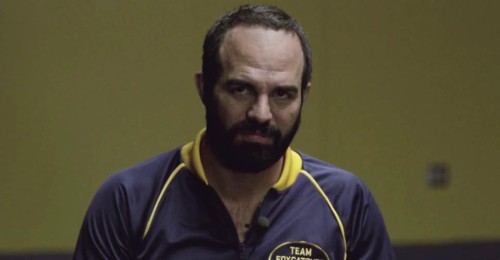
Mark Ruffalo, “Foxcatcher” (2014, Bennett Miller dr.)
I wanted to mention a film that came out recently, Foxcatcher. As studio funded films go, this is about as good as one will get. And it is a film that expresses something of exactly this pathology of blindness in the ruling classes. Based on the real story of a murder of Olympic wrestler Dave Schulz by billionaire John DuPont, the film is a strangely unsettling experience. I cannot think of another film in which the expectations of storytelling, and of the rhythms of editing are so disrupted. Within each sequence the anticipated resolution never comes. If this were music it would be Shoenberg. It may not be a masterpiece, whatever that is, but it is a haunting film. And Steve Carell and Channing Tatum are very good, but the performance that stands out is that of Mark Ruffalo as the elder of the two wrestling brothers. Few actors today have the sort of gravitas that Ruffalo has, and his performance is the moral center of the film. His character is not exactly the moral center, but by virtue of Ruffalo’s presence, the narrative coalesces around his near tragic resignation. It is his eyes when a camera crew asks him to speak of DuPont’s role as mentor. Knowing that to lie is the only choice he has, he goes ahead and lies. But it is his eyes, the choice, the history of taking care of his brother, his vulnerability born of responsibility to his wife and children, and brother, all of it is there in a couple brief hesitations before speaking.
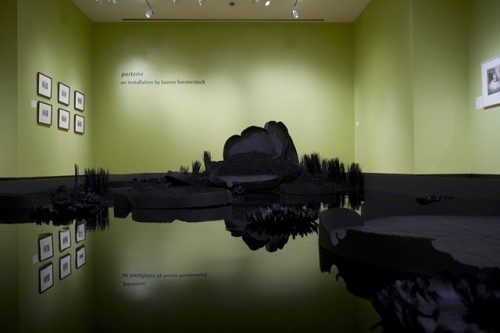
Lauren Fensterstock; “Black Garden”.
Lauren Fensterstock’s installations have been getting a lot of coverage lately. And they’re very effective pieces. I am not sure quite how to evaluate this work. But they did remind me of this:
http://www.archdaily.com/49230/rosa-muerta-robert-stone/
There is an undeniable feeling of sublimity in Fensterstock’s installations, while she simultaneously is negating that sublimity. They are simple on one level, and yet subtly nuanced in terms of their manufacture. It is unclear, at least to me, just how significant this work might be, but it’s clearly a genuine achievement that at first glance invites an anticipation of further work. Is this work to which one wants to return? I don’t know. But it made me think, to return to this idea of historical distance, that it was the 1950s in which the U.S. began a certain cultural lurch to the right, and to the valorizing of conformity. It was post WW2, but the start of the Korean war (!) and soon McCarthyism and the government focus on anti-communism. And it was the start of television. Adorno’s essay on television, written only a few years after Dialectic of Enlightenment, and written upon his return to Germany, is worth revisiting here. Adorno saw something very specifically related to an unconscious hostility in the viewer, toward both him or herself, and toward his or her life.
“The world, threateningly devoid of warmth, comes to him like something familiar, as if specially made just for him: the contempt he feels for it is the contempt he feels for himself. The lack of distance, the parody of fraternity and solidarity has surely contributed to the extraordinary popularity of the new medium.”
Adorno
“Prologue to Television”
Something dreary, as Adorno put it, of the viewer’s own life is reflected back at them. It is worth thinking about the technical advances in TV, and to compare a new 50 inch flat screen plasma TV with those black and white boxes from the 50s. The viewer no longer sees dreary, they see The Spectacle. But the dreariness remains, covertly. The dreariness is now moved into narratives of punishment and cruelty and revenge. The shared experience of popular shows is now the material of daily discourse, masking the fact that people have less and less to say to each other. And this, too, is because history is receding.
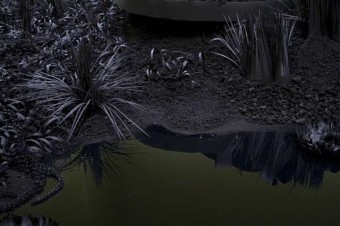
Lauren Fensterstock
There is a sense I have of white men, masculinity in white society, that today is more authoritarian than at any time in the last couple hundred years. The rape culture on University campuses is a brutality learned and experienced seated in front of a screen. The historical forces that produce misogyny are enhanced and intensified in this case.

Simon Harsent, photography.
“The culture industry makes use of the intimate effect of television to ‘engender a community’ as a kind of lure, which, to put it in Freudian terms, could be explained as the effect that creates a libido group bound by narcissistic ties.”
Yoshikazu Takemine
The fascist mentality today is not created by TV, it is only more easily formed by social forces because of this pseudo narcotized mentality that is the result of prolonged exposure to mass media. And there is another dimension to this transformation into the authoritarian I see so much today and that is with the receding of ‘real’ history, and with the resulting amnesia almost, the belief in authority, or in specific leaders or political agendas matters less and less. The cynicism of a TV generation means that *belief* is only an instrument, a tool, wielded when needed. The “its only a TV show, or its only a movie” sentiment is just a way of saying I dont really believe in anything. Its only *truth*. Its only my belief, who cares. Mass culture today is always winking at the audience. The message is, this is only ironic, and you are only ironic. And if you rape that girl, that’s sooooooo ironic. Blowing up Baghdad is ironic, too. Drones are hugely ironic.
The heterogeneous artwork then, is disruptive because it is serious and not ironic. The Fensterstock piece is not ironic, at least I don’t think it is. And in that sensual black surface resides something rather profound, even if elusive. The gradients of black, the evocative quality of the water within this blackness, all of it is both artifical and allegorical. So on one level, or in one case, the artwork that manages a distance from the false fraternity of electronic media is de-facto destabilizing. There is also in the heterogeneous artwork a quality of something elemental. And in that sense of elemental lurks, often, something uncanny. And this sense of the elemental or primordial is, at the mimetic level, destabilizing.

Hiroyuki Hamada
Adorno wrote his essays on TV over fifty years ago. What is most striking in his analysis is the equation with fascism that is inherent in this medium. Not that it had to be so, but that under Capitalism, it was going to be so. The fact that TV, and by extension the entire mass culture of electronic media does not hide its basic fraudulence is the critical factor, I think. This is partly a debt to Freud. The blatant but insistent lie, as Adorno wrote. Narcissism and cynicism are linked. The unserious, the openly dishonest is nevertheless identified with (privately) and this is the unconscious activation of primary aggression. Fast forwarding to the Sony hacking story, and to the Rogan and Franco vehicle, the fifty year old critique of Adorno remains intact, only history is retreating ever further in the rear view mirror. The fact that The Interview is a comedy only underlines the blurring of such categories. The cynical identification is with the ‘product’, with the system that manufactures it. The system is always right.
The degrading of tragedy to simply suspense, or inconvenience is really the result of expectation in the audience for an identification first. Everything else follows after the cynical and secret identification with what is already cynically *known* to be false. The insider isn’t fooled. The hip media savy viewer enjoys his or her position as connoisseur of the cynical. And this insider identification is one saturated with repressed resentment. There is also an obsessive need to classify. The making of lists, awards, ironic or otherwise is where the enjoyment takes place. This is a sort of vandalized version of ‘camp’. The other end of the spectrum is the prestige product, the appropriating of cultural cache by ‘knowing’ which prestige film is the most fashionable. At no level in this is the artwork, and an autonomous tension ever really engaged with. It is the end of mimesis, for mimesis cannot exist without history. That re-narrating is only possible (except as pure cartoon mimicry) when the voices of the past intrude, when one hears what one has forgotten previously, or never knew. This is always a knotty proposition, and not really to the point here, but the aesthetic resistance that art potentially provides is the first victim of a surplus aggression.

Stephan Balkenhol
Yugoslavian Stjepan Mestrovic, in 1997, coined the term *post-emotional society*. For him, human emotion has gradually atrophied, leaving only a shadow version.
This is the TV interviewer asking a victim of violence “how do you feel?” There are no answers and yet there are always answers. Only those answers are the answers of a marionette. For Mestrovic, the termination of genuine emotion was linked directly to mass culture, especially to TV. The ironic has subsumed sincerity. This has been a trend since the Enlightenment, of course, and it was Kierkegaard who said (I paraphrase) that we never know when we are being sincere. This loss of emotional connection, however one exactly traces its erosion, is accompanied by a deformed version of friendship. Today, the screen has replaced fraternity and family. It acts as a filter, too, in that with a gradual loss of affect, close relationships take on a quality of surreality. Identifying the emotions in another’s face is now more difficult — the imitation of the symptoms of autism — as well as, I’m pretty sure, an incremental paralysis of the face. Botox might just be a response to a new ideal post emotional human. The rise of marketing has meant a rise in the language of marketing. The inflated emotional vocabulary of ad-copy has worn down the meaning of a grammar of intimacy. Today, popular mass culture produce an ersatz version of family, solidarity, friendship and love. I have personally known more than one person tell me “I never know how I really feel”. As if feeling were something outside of them that they were failing to recognize, like trying to read a street sign written in a language you don’t speak. Friendship, like in The Interview, is where you kill people together. For men, every friendship is part of a private cop buddy movie.
Adorno called this (over fifty years ago) deformed false presentation of humanness; *affability*. It is an ‘almost’ emotion. A population ever more encouraged toward not growing up has meant that boys stay boys until middle age, or longer.
“…that is the secret of happiness and virtue—liking what you’ve got to
do. All conditioning aims at that: making people like their unescapable social destiny”
Aldous Huxley
The epidemic use of anti-depressants falls in line with all of this. Psychotropics re-create the familiar numbness, but at a manageable frequency. They only dial down what is already there, a disconnect.

Amy Pascal and Aaron Sorkin.
“When the Modern Library asked its editorial board to select the 100 best novels of the 20th century, the top choice was Ulysses. In a companion poll of readers, it was Atlas Shrugged. We recognize, when it comes to food (the new summit of cultural esteem), that taste must be developed by a long exposure, aided by the guidance of practitioners and critics. About the arts we own to no such modesties. Prizes belong to the age of professionals. All we’ll need to measure merit soon is the best-seller list…”
and then…
“…’Producerism’ we can call this, by analogy with consumerism. What we’re now persuaded to consume, most conspicuously, are the means to create. And the democratization of taste ensures that no one has the right (or inclination) to tell us when our work is bad. A universal grade inflation now obtains: we’re all swapping A-minuses all the time, or, in the language of Facebook, “likes.”
It is often said today that the most-successful businesses are those that create experiences rather than products, or create experiences (environments, relationships) around their products. So we might also say that under producerism, in the age of creative entrepreneurship, producing becomes an experience, even the experience. It becomes a lifestyle, something that is packaged as an experience—and an experience, what’s more, after the contemporary fashion: networked, curated, publicized, fetishized, tweeted, catered, and anything but solitary, anything but private.”

Abraham David Christian
The implications are clear enough, really, but also, the psychic state that allows, or rather invites this absolute flatlining of taste, judgement, even the capacity for difference, is the post emotional, if we choose that term, or post cynical autistic or whatever one likes. The salient factors, all referred to above, begin with the stoppage of history as an idea, as reason, as material, as mattering. The distance in that metaphoric rear view mirror is right at the edge of the horizon now. It may not even be there, in fact. The reclamation of history, in the individual, is found in the material, in the concrete of experience. As paradoxical as that sounds, the full experience of a night sky is only complete with some, however fleeting, sense of place and continuity. With history. The appearance of a fox in the woods, suddenly awakens one to the accumulative metaphorical currents of that animal, of the ‘coming upon’ moment in the woods or forest, and the glance of the animal itself. The animal eye is historical. For evolution left him behind. I forget who said that, that the eye of mammals suggest accusation. They ask why did you leave us behind? All of this is carried forward by history. There is no allegory without it. One of Adorno’s criticisms of psychoanalysis, as it developed in the U.S., is that it worked to deny the suffering rather than facing it, and making not just the patient but the community understand it. The pharmaceutical trend in treatment is in the interests of hiding, of masking that suffering ever occured. Rarely do people announce that they take anti depressants.
I ran across a correspondence between Einstein and Freud. I shall end with a relevant quote from Freud:
“This recognition of a community of interests engenders among the members of the group a sentiment of unity and fraternal solidarity which constitutes its real strength. … I have set out what seems to me the kernel of the matter: the suppression of brute force by the transfer of power to a larger combination, founded on the community of sentiments linking up its members.
Thenceforward there exist within the state two factors making for legal instability, but legislative evolution, too: first, the attempts by members of the ruling class to set themselves above the law’s restrictions and, secondly, the constant struggle of the ruled to extend their rights and see each gain embodied in the code, replacing legal disabilities by equal laws for all.”

I agree. What you’ve hit on the head is the role of TV, film and all social media in America. History receding in the rear-view mirror is an apt and terrible description. Although now in LA at least it is acceptable to admit to using anti-depressants – it is a badge of ersatz honesty laid over the attempt to not feel overwhelmed by the machinery of the meaningless day-to-day. Interesting.
RICHARD II: Mark, silent king, the moral of this sport,
How soon my sorrow hath destroy’d my face.
HENRY IV: The shadow of your sorrow hath destroy’d
The shadow or your face.
Dammit. It should be
“The shadow of your sorrow hath destroy’d
The shadow OF your face.”
Just as a footnote to the Sony hacking story, it was interesting to listen to a couple of recent shows on Warren Olney’s To The Point broadcast on L.A.’s KCRW (available as Podcast–12/16 show and then 12/22 show) On the 12/16 show half of the report on the hacking story was devoted to comments by ex-hackers, now in the cyber-security business. One of them said that to gain access to the amount of data the hackers now possess would have taken 6 months of effort. Another is “skeptical” of press reports that North Korea had any direct involvement, since a significant motive of the cyber attack seemed to be extortion of money from various execs in exchange for not releasing the emails and other content. Doubt was cast on the motive behind the hacking, and on the fuzzy source of information that the same markers as those found in the cyber attacks on South Korean banks some months ago…unconfirmed. Then the 12/22 show comes out, after North Korea is fingered by the FBI etc etc, and Jim Lewis of the Center for Strategic and International Studies is brought on to go on at length on all the whys and wherefores of the North Korean cyberattack, now a stone cold fact in the media. Yup, it’s another one of those very convenient stories to amp up a state of perpetual cold war. (Check out CSIS here http://www.sourcewatch.org/index.php/Center_for_Strategic_and_International_Studies)
Brilliant and important. Thanks, John.
Thank you for vocalizing the deep sense of dread I feel when glancing at our current menu of cultural offerings. This modern imperial methodology is absolutely more sinister than it’s ever been, if anything, because it fails to respect the humanity of the consumer, refuses to acknowledge the human mind’s ability to critically think for oneself. It’s incredibly cynical and marches in perfect lockstep with these “how many fingers am I holding up?” sort of challenges we keep hearing from the presidential podium.
Everyone knows, eyes rolled, that things are not as they seem, but you are terribly uncool or looking to cause trouble if you vocalize it. Obviously everyone has the ability to see the intense racism packaged into products like “The Interview”, but people who challenge it are clearly aligning themselves against empire – and so, the racism is supposed to be excused, why, anything would be excused (see Polanski the rapist) in the interest of art and freedom of expression, right?
And yet even *this* has been cynically exposed as false. Now, we are supposed to simply fight for the right to snark and roll our eyes. We fight for the right to deny responsibility and bury our heads in the sand, to accept that reality is endlessly customizable. We are supposed to gladly become drooling slaves if only we’re allowed access to the liquor that makes us believe we are masters of the universe.
Yes thanks also.